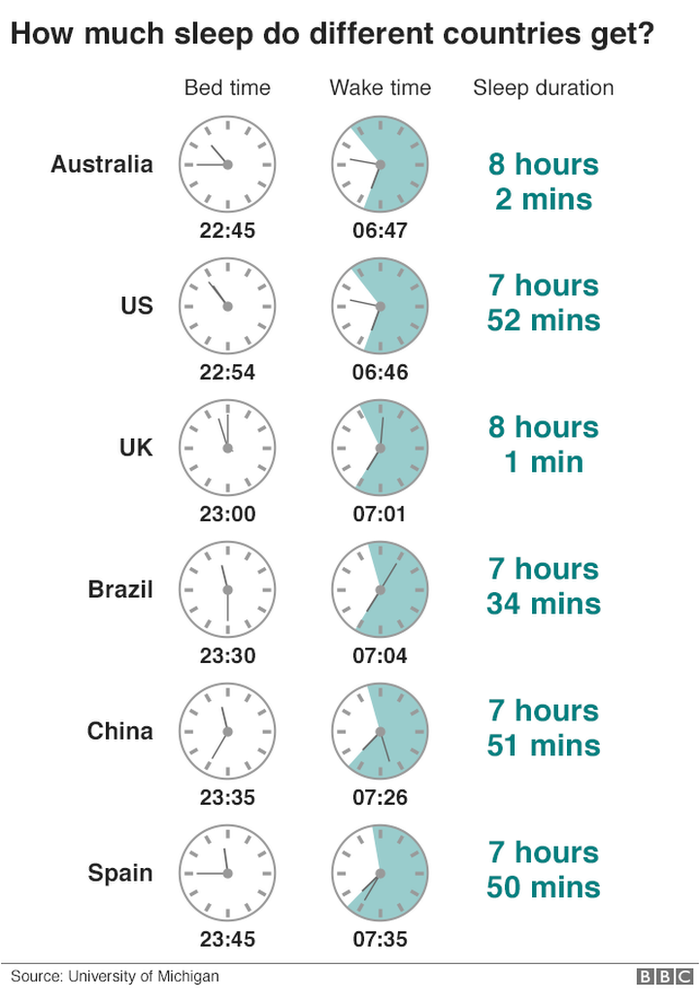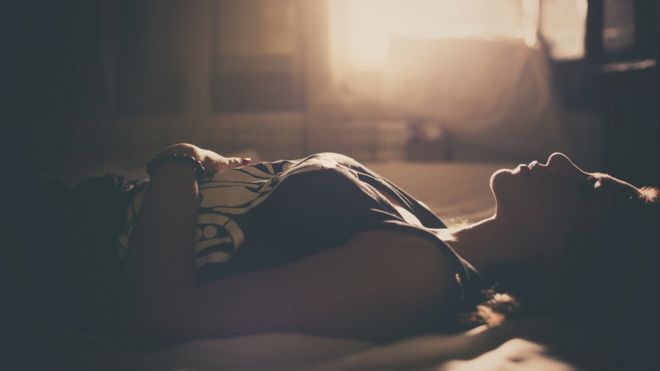10 things to know about sleep as the clocks go back
- We're told to get our eight hours
We often hear that we should all be getting eight hours' sleep a night. Organisations from the NHS to the US National Sleep Foundation recommend it. But where does this advice come from?
Studies carried out around the world, looking at how often diseases occur in different groups of people across a population, have come to the same conclusion: both short sleepers and long sleepers are more likely to have a range of diseases, and to live shorter lives.
- What happens in your body when you don't sleep enough?
Poor sleep has been linked to a whole range of disorders.
A review of 153 studies with a total of more than five million participants found short sleep was significantly associated with diabetes, high blood pressure, cardiovascular disease, coronary heart disease and obesity.
- We need different types of sleep to repair ourselves
After we fall asleep we go through cycles of "sleep stages", each cycle lasting between 60 and 100 minutes. Each stage plays a different role in the many processes that happen in our body during sleep.
- Shift workers who have disturbed sleep get sick more often
Shift work has been associated with a host of health problems. Researchers have found shift workers who get too little sleep at the wrong time of day may be increasing their risk of diabetes and obesity.
Shift workers are significantly more likely to report "fair or bad" general health according to a 2013 NHS study, which also found people in this group were a lot more likely to have a "limiting longstanding illness" than those who don't work shifts.
- And many of us are feeling more sleep deprived than ever
To judge from media reports, you'd think we were in the grip of a sleeplessness epidemic. But are we really all more sleep deprived than before?
A big piece of research looking at data from 15 countries found a very mixed picture. Six showed decreased sleep duration, seven increased sleep duration and two countries had mixed results.
Lots of a evidence suggests the amount we sleep hasn't changed that much in recent generations.
- But we didn't necessarily always sleep this way
Aside from a few outliers - Margaret Thatcher could apparently get by on only four hours a night - people tend to go to bed in the late evening for around seven or eight hours.
But this wasn't necessarily always the norm according to Roger Ekirch, a history professor at Virginia Tech in the USA. He published a paper in 2001 drawn from 16 years of research.
- Phones are keeping teenagers awake
Sleep experts say teenagers need up to 10 hours sleep a night, but almost half don't get this much according to the NHS.
Bedrooms are supposed to be a place of rest but are increasingly filled with distractions like laptops and mobile phones, making it harder for young people to nod off.
We have more different types of entertainment on offer than ever, making the temptation to stay awake greater. The blue light emitted by electronic devices makes us feel less sleepy. And the activity itself - be it talking to friends or watching TV - stimulates our brain when it should be winding down.
- Testing for sleep disorders is on the up
More people are turning up at their doctors complaining of problems sleeping.
Analysing data collected by NHS England, the BBC found in June that the number of sleeping disorder tests had increased every year over the past decade.
- Are other countries doing it differently?
One study looked at sleep habits in 20 industrialised countries.
It found variations of up to an hour in the time people went to bed and woke up, but overall sleep duration was fairly constant across countries. Generally, if a population on average went to bed later, they woke up later too, although not in every case.
- Morning larks, night owls?
There have always been morning people and evening people. We even have genetic evidence that backs this up.
But the introduction of artificial light appears to have exacerbated this effect, particularly for people who prefer to stay up late.
If you are already inclined towards being a night owl, artificial light will make you stay up even later.
About 30% of us tend towards being morning people and 30% towards being evening people, with the other 40% of us somewhere in the middle - although marginally more people prefer early rising to late nights.

welcome
Didn't know this info. Thanks a lot.
good job
good article but in my case it is not possible to follow the standard routine due the modern life style.
i like your post following you and up
Thanks for sharing
Goog info for us
Hi! I am a robot. I just upvoted you! I found similar content that readers might be interested in:
http://www.bbc.co.uk/news/health-41666563
thanks
welcome..
@ashiqurs